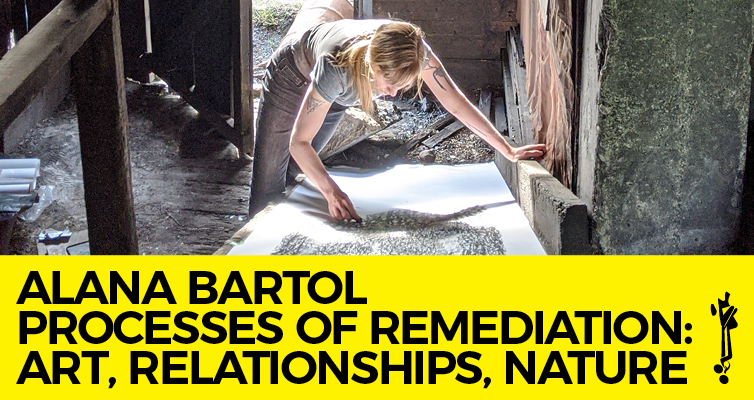The Processes of Remediation: art, relationships, nature will be available for viewing by scheduling a tour via Eventbrite.
What does remediation mean in this moment of ecological crisis? Visit dowsinganddigging.com and join artist Alana Bartol and the University of Lethbridge Art Gallery to use the power of art to open up dialogue about the future of coal in Alberta.
Processes of Remediation: art, relationships, nature is a multi-part project by Mohkinstsis (Calgary) based artist Alana Bartol. Adapted to the closure of public spaces and events, the project involves an online residency, mentorship of two emerging artists, and culminates with an exhibition in uLethbridge’s Hess Gallery.
The exhibition will run January 21 to September 25, 2021 and will not initially be open for in-person visits. Exhibition photos and more can be found here. As COVID-19 protocol develops, we will implement safe in-person access to the exhibition.
The project Processes of Remediation: art, relationships, nature began in Spring 2020 and involves the uLethbridge Art Gallery supporting Bartol in pursuing in-depth research about what it would mean to create remedies for our current environmental crisis and how we would engage diverse people in having a productive conversation about this issue. Bartol has connected with scientists at uLethbridge who study climate change, prairie plants, and insects. She has stayed in the Crowsnest Pass and the uLethbridge’s Coutts Centre for Western Canadian Heritage (a botanical garden and working farm near Nanton, Alberta), and met with Niitsitapi (Blackfoot) Elders and Knowledge Keepers.
The goal of Processes of Remediation: art, relationships, nature is to provide Bartol with the time and resources to conduct in-depth research and develop a major new area in her art practice. When Bartol first proposed engaging with coal mining in Southern Alberta, it had seemed this would be a historical reference. Instead, because of changes in Alberta’s provincial legislation, the plan to allow open-pit coal mining in the Crowsnest Pass is underway and presents a real and immediate danger to the watershed, plants, fish, and animals in Southern Alberta. As a result, Bartol focused the project around the proposed Grassy Mountain Coal Mine and she is creating work directly connected with a pressing environmental issue.
Processes of Remediation: art, relationships, nature harnesses the power of art to provide new perspectives and open up dialogue in order to respond to one of the most important issues of our times. Bartol has been writing and posting videos, images of drawings, and photographs on dowsinganddigging.com, a blog she created as part of the residency. Through this online format, the artist is making her research public and thereby inviting people to join in learning along with her.
The project draws on Bartol’s work with dowsing (she comes from a long line of water witches) and the history of dowsing in connection to mining/resource extraction. Specifically, Bartol researched Martine de Bertereau, one of the first (recognized) female mineralogists and mining engineers in 17th century France who traveled Europe in search of mineral deposits utilizing specialized divining instruments and other techniques including botany. She was accused of witchcraft and died in France while in prison. The story of de Bertereau is a complex one that points to the violence of resource extraction and the development of capitalism that she both participated in and was killed by. In her artwork, Bartol uses dowsing to ask us to reconsider consumption-driven relationships to the earth and what are known as ‘natural resources.’
Bartol’s research has also included using the Galt Museum Archives in Lethbridge, Alberta to study relationships with the coal deposits and mining history around Lethbridge. The gardeners at the Coutts Centre, particularly Kara Matthews and John Stoll, have provided extensive knowledge about local plants and soil health. Elders and Knowledge Keepers Mary Fox, Bruce Wolf Child, Monte Little Plume, Andrea Fox, and Melissa Shouting have shared knowledge about Blackfoot protocols with the land and plants. Bartol has been mentoring emerging artists Kylie Fineday and Angeline Simon, who are each developing solo projects for the uLethbridge Art Gallery for 2021.
On November 5, 2020, uLethbridge Art Gallery hosted a live event on Zoom with artist Alana Bartol called Textured Readings: Experimenting with Charcoal Rubbings to reflect on the #invisibleimpact that humans have on the landscape. Bartol discussed the artworks she is making with charcoal rubbings on surfaces in everyday environments.
Josephine Mills, Director/Curator
Funded by the Alberta Foundation for the Arts, Calgary Arts Development, the Department of Canadian Heritage, and the Canada Council for the Arts.
